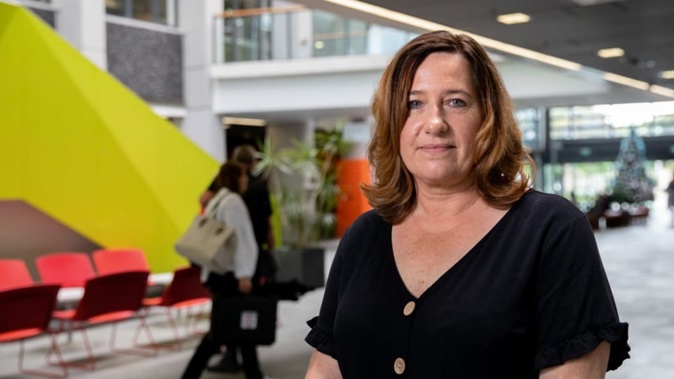
Security staff at the Employment Court removed a man from a courtroom this morning after he attempted to speak to scientist Dr Siouxsie Wiles’ legal team.
The man entered the courtroom in Auckland during a break in proceedings around 11.30am. He approached Wiles’ lawyer Catherine Stewart before security quickly intervened and led him out by the arm.
He was led out of the building on Federal St in Auckland and was heard telling security officers he had wanted to give evidence to the legal team. Stewart appeared rattled by the encounter.
It came after a separate security incident on Tuesday, when a person came on to the University of Auckland campus asking to speak to Wiles.
That incident prompted the university’s lawyers to raise concerns about media coverage of the court hearing, saying it could create a health and safety issue.
The security intervention came while one of New Zealand’s top vaccine experts, Associate Professor Helen Petousis-Harris, was giving evidence.
Her employer, the university, is accused of failing to protect Wiles from harassment and threats which stemmed from her Covid-19 commentary.
Petousis-Harris, like Wiles, became a prominent media commentator in 2021 when vaccination was in the spotlight.
As a result, she also started receiving abuse - via email, phone calls, texts, and Facebook Messenger. While she had previously faced harassment for her comments on measles vaccination, the Covid-19 abuse was “on a whole new level”, she told the court.
She was named on a “Nuremberg list” online for “crimes against humanity”. She also received abusive messages after her colleague, Dr Simon Thornley, publicly called her a “liar” and invited members of anti-vaccination group Voices For Freedom to one of her public talks at the university, the court heard.
- University of Auckland grew uncomfortable with Siouxsie Wiles' celebrity status, court hears
- Siouxsie Wiles case: University of Auckland raises concerns about media coverage after incident on campus
Petousis-Harris was advised by a colleague, disinformation researcher Kate Hannah, that the harassment was likely to escalate.
She asked for a meeting with university managers and legal team, before which the university sought legal advice.
“I was shocked to read that the university’s legal advice was that academics should not comment on Covid-19 to [reduce] harassment and [limit] the university’s liability,” Petousis-Harris said.
Petousis-Harris was “mortified” when this message was implied at the meeting by the university’s counsel, Ronni Cabraal, the court heard.
“I felt the message … was quite traumatic… and that the harassment was my own fault,” she said.
Hannah was also in the meeting and highlighted the gendered nature of the abuse and that female academics faced worse abuse than their male counterparts.
“When we raised gender, Mr Cabraal said that was another thing we needed to consider,” Petousis-Harris said.
“This seemed like another slap in the face. [Kate Hannah] asked him ‘Shall we make sure our skirts are a bit longer?’”
The university’s lawyers have argued during the hearing that it was reasonable to ask academics to lower their profile while security assessments were carried out.
Academic freedom was not “unfettered” and had to be balanced against health and safety obligations, they have argued.
“I put it to you that there is nothing unreasonable about asking Dr Wiles to limit her public activities while a security risk was undertaken?” lawyer Rachael Judge said to Petousis-Harris.
Under cross-examination, Petousis-Harris acknowledged that she was never directly told that she was responsible for the harassment against her or that media commentary was not part of her job.
The hearing continues this afternoon. Former head of physics at the university, Richard Easther, is giving evidence.
Vice Chancellor Dawn Freshwater and members of the university’s HR team were in the public gallery while he was in the stand.
Take your Radio, Podcasts and Music with you









